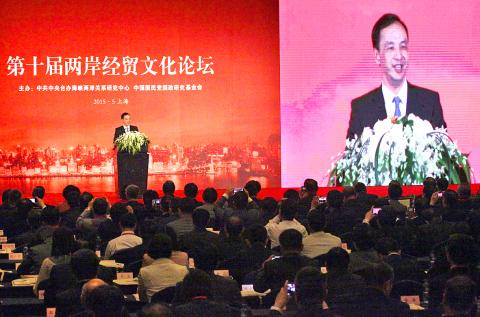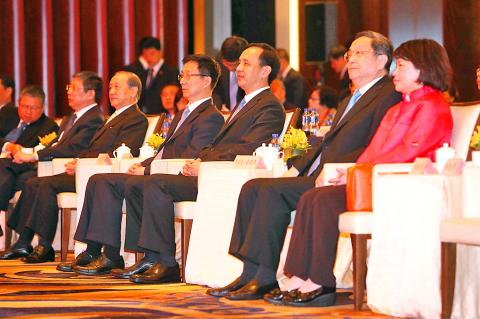New Taipei City Mayor and Chinese Nationalist Party (KMT) Chairman Eric Chu (朱立倫) yesterday expressed hope that Taiwan would develop a greater role in the global community based on the so-called “1992 consensus” between Taiwan and China.
Speaking at the 10th Cross-Strait Economic, Trade and Culture Forum in Shanghai, Chu said that he expects Taiwan to play a bigger role if the nation takes part in the China-initiated Asian Infrastructure Investment Bank (AIIB), Beijing’s “One Belt, One Road” trade initiative and the Regional Comprehensive Economic Partnership (RCEP) trade bloc.
Despite its smaller economy, land mass and population, Taiwan has strengths in innovation, management experience and research and development, allowing it to make substantial contributions to regional economic development through cooperation with China, Chu said.

Photo: AP
The “1992 consensus” refers to a supposed understanding between the KMT and the Chinese Communist Party (CCP) that both Taiwan and China acknowledge there is “one China,” with each side having its own interpretation of what that means. In 2006, former KMT legislator Su Chi (蘇起) admitted that he made up the term “1992 consensus” in 2000, when he was head of the Mainland Affairs Council, before the KMT handed power to the Democratic Progressive Party.
National Committee of the Chinese People’s Political Consultative Conference Chairman Yu Zhengsheng (俞正聲) said that Chu’s ideas could be discussed further at the annual KMT-CCP forum, as part of efforts to seek Taiwan’s participation in the AIIB, the “One Belt, One Road” initiative and the RCEP, and further possible approaches for cross-strait cooperation.
The discussions are aimed at increasing the competitiveness of “ethnic Chinese” and expanding their presence in the international market, Yu said.

Photo: CNA
Yu also said that the annual forum should stick to China’s stance regarding the “1992 consensus” and opposition to Taiwanese independence, which he described as a “mutual political foundation” for the development of cross-strait relations.
As China enters what has been called a “new normal” with lower economic growth, Beijing plans to help drive rational industrial positioning and introduce new measures for Taiwanese companies in China to address their problems with transformation and upgrading, Yu said.
China will also continue to protect the interests of the Taiwanese public, small and medium-size businesses, farmers and fishermen, allowing them to enjoy the benefits of enhanced cross-strait relations, he said.
Yu also urged the expansion of youth exchanges between Taiwan and China to encourage the wider involvement of young people in efforts to improve related policies.
Chu arrived in Shanghai on Saturday with a 100-member delegation to attend the annual KMT-CCP economic and cultural forum.
The highlight of Chu’s three-day visit is expected to be his first meeting with Chinese President and CCP General Secretary Xi Jinping (習近平). The meeting is to take place in Beijing today.
Chu yesterday avoided giving a direct answer to reporters’ questions about a peace pact between Taiwan and China.
Asked whether he would take advice provided by New Party Chairman Yok Mu-ming (郁慕明) and raise the issue of a cross-strait peace accord during a meeting with Xi, Chu said only that there are different opinions in Taiwan regarding the issue.
Some people prefer a more active pursuit of a peace pact and some are against it, but the KMT has its own objective and course of action, he said.
“We will hold our ground on what to do,” Chu said.

Tropical Storm Gaemi strengthened into a typhoon at 2pm yesterday, and could make landfall in Yilan County tomorrow, the Central Weather Administration (CWA) said yesterday. The agency was scheduled to issue a sea warning at 11:30pm yesterday, and could issue a land warning later today. Gaemi was moving north-northwest at 4kph, carrying maximum sustained winds near its center of up to 118.8kph and gusts of 154.8kph. The circumference is forecast to reach eastern Taiwan tomorrow morning, with the center making landfall in Yilan County later that night before departing from the north coast, CWA weather forecaster Kuan Shin-ping (官欣平) said yesterday. Uncertainty remains and

SEA WARNING LIKELY: The storm, named Gaemi, could become a moderate typhoon on Wednesday or Thursday, with the Taipei City Government preparing for flooding A tropical depression east of the Philippines developed into a tropical storm named Gaemi at 2pm yesterday, and was moving toward eastern Taiwan, the Central Weather Administration (CWA) said. Gaemi could begin to affect Taiwan proper on Tuesday, lasting until Friday, and could develop into a moderate typhoon on Wednesday or Thursday, it said. A sea warning for Gaemi could be issued as early as Tuesday morning, it added. Gaemi, the third tropical storm in the Pacific Ocean this typhoon season, is projected to begin moving northwest today, and be closest to Taiwan on Wednesday or Thursday, the agency said. Today, there would likely

DISRUPTIONS: The high-speed rail is to operate as normal, while several airlines either canceled flights or announced early departures or late arrivals Schools and offices in 15 cities and counties are to be closed today due to Typhoon Gaemi, local governments announced last night. The 15 are: Taipei, New Taipei City, Taoyuan, Tainan, Keelung, Hsinchu and Kaohsiung, as well as Yilan, Hualien, Hsinchu, Miaoli, Chiayi, Pingtung, Penghu and Lienchiang counties. People should brace for torrential rainfall brought by the storm, with its center forecast to make landfall on the east coast between tonight and tomorrow morning, the Central Weather Administration (CWA) said. The agency issued a sea warning for the typhoon at 11:30pm on Monday, followed by a land warning at 11:30am yesterday. As of

CASUALTY: A 70-year-old woman was killed by a falling tree in Kaohsiung as the premier warned all government agencies to remain on high alert for the next 24 hours Schools and offices nationwide are to be closed for a second day today as Typhoon Gaemi crosses over the nation, bringing torrential rain and whipping winds. Gaemi was forecast to make landfall late last night. From Tuesday night, its outer band brought substantial rainfall and strong winds to the nation. As of 6:15pm last night, the typhoon’s center was 20km southeast of Hualien County, Central Weather Administration (CWA) data showed. It was moving at 19kph and had a radius of 250km. As of 3pm yesterday, one woman had died, while 58 people were injured, the Central Emergency Operation Center said. The 70-year-old